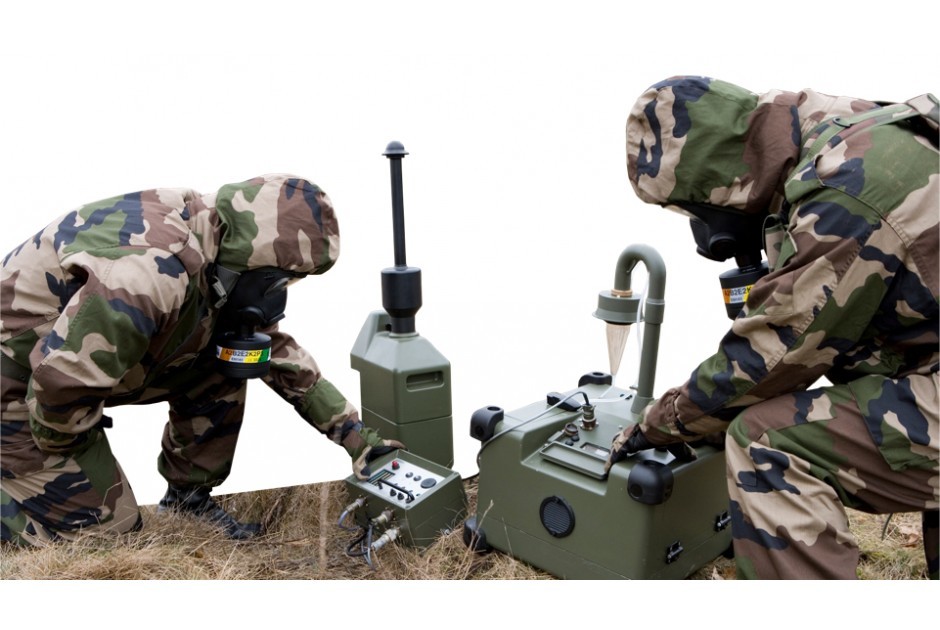ISO 7933 Heat strain PHS model assessment and validation testing
The ISO 7933 standard provides a comprehensive framework to assess and validate heat stress models, which are critical for ensuring the safety of personnel in hot environments. This test is particularly relevant for sectors like military operations, where soldiers and other personnel may be exposed to extreme conditions.
Heat strain, or PHS (Physical Heat Strain), testing evaluates how well a person can tolerate heat stress while performing physical work. The primary goal of this assessment is to determine the thermal load that a worker can sustain without compromising performance or health. This includes evaluating the physiological responses such as core temperature increase, heart rate acceleration, and electrolyte loss.
The ISO 7933 model takes into account several key factors including ambient air temperature and humidity, metabolic heat production, and clothing insulation. By simulating these conditions in a laboratory setting, we can accurately measure how well protective equipment (PE) and other interventions perform under actual operational stress.
For quality managers and compliance officers looking to ensure their products meet or exceed international standards, this test is essential. It allows for the validation of new models or improvements to existing ones, ensuring they are fit for purpose in real-world scenarios. For R&D engineers working on innovative solutions like next-generation PE, this testing provides critical data points that can guide further development.
The process involves exposing individuals wearing the equipment to controlled environmental conditions designed to simulate field operations. Vital signs such as body temperature and heart rate are continuously monitored throughout the test duration. This allows for precise determination of when heat strain begins to affect performance or health, providing valuable insights into both the limits of current technology and areas for improvement.
In addition to these physiological measurements, cognitive function tests may also be conducted to assess changes in mental acuity due to heat stress. These findings are crucial not only from a safety perspective but also regarding operational effectiveness. For instance, even minor decrements in cognitive abilities could have significant impacts on mission success rates or unit readiness.
Understanding how different factors interact within the model helps manufacturers optimize their designs for better protection and comfort. From selecting appropriate fabrics to enhancing ventilation systems inside helmets, every aspect contributes towards improving overall heat management capabilities.
The importance of this testing cannot be overstated when considering its role in safeguarding human life under harsh conditions. By rigorously evaluating our products against established criteria, we contribute significantly toward maintaining high standards within the industry and promoting safer working environments globally.
- Customer Impact: Ensures compliance with international safety regulations.
- Satisfaction: Provides peace of mind that personnel are equipped with robust protection against heat stress.
- Operational Effectiveness: Optimizes performance by identifying optimal parameters for comfort and safety.
Why Choose This Test
Selecting the right testing method is crucial in ensuring that your products meet stringent quality standards. Our ISO 7933 heat strain PHS model assessment offers several advantages over other methods:
- Comprehensive Evaluation: It provides a full range of metrics including physical parameters (core temperature, heart rate) and cognitive performance indicators.
- Reproducibility: Standardized procedures ensure consistent results across multiple trials, enhancing reliability.
- Real-World Simulations: By closely mimicking actual operational conditions, we provide accurate representations of expected outcomes in field environments.
- Regulatory Compliance: Meeting international standards like ISO 7933 demonstrates commitment to high-quality manufacturing practices and adherence to best industry norms.
These benefits make our service an ideal choice for organizations aiming to enhance product performance while maintaining strict regulatory compliance. Whether you're developing new technologies or refining existing ones, this testing ensures that your solutions are not only effective but also safe for use in challenging conditions.
Customer Impact and Satisfaction
By choosing our ISO 7933 heat strain PHS model assessment service, customers experience tangible benefits that enhance both operational efficiency and personnel safety:
- Increased Safety: Ensures compliance with international standards, thereby reducing risks associated with inadequate protection.
- Better Decision Making: Provides detailed insights into how various factors influence heat stress, enabling informed choices about design modifications.
- Enhanced Reputation: Demonstrates a commitment to excellence and regulatory adherence, bolstering brand reputation among clients and stakeholders alike.
- Improved Product Quality: Allows for continuous improvement based on empirical evidence rather than assumptions alone.
The resulting products are more reliable, safer, and better suited to meet the demands of demanding operational scenarios. This translates directly into increased customer satisfaction and loyalty, which is vital in maintaining long-term relationships within the sector.
International Acceptance and Recognition
The ISO 7933 standard has gained widespread recognition across various industries due to its robustness and applicability. Its acceptance by military organizations worldwide underscores its value as a benchmark for heat stress evaluation:
- American Military: The US Department of Defense frequently references ISO standards in procurement documents, indicating strong support for their use.
- NATO Compliance: NATO member countries have incorporated these guidelines into their own specifications, reflecting international consensus on the standard's validity.
- European Standards: Euro-Norm (EN) equivalents of ISO 7933 are widely used in Europe, further emphasizing its global relevance.
This universal acceptance ensures that any product validated using this method is universally applicable and acceptable wherever it might be deployed. This not only simplifies compliance processes but also opens up markets for manufacturers who wish to export their products globally.





